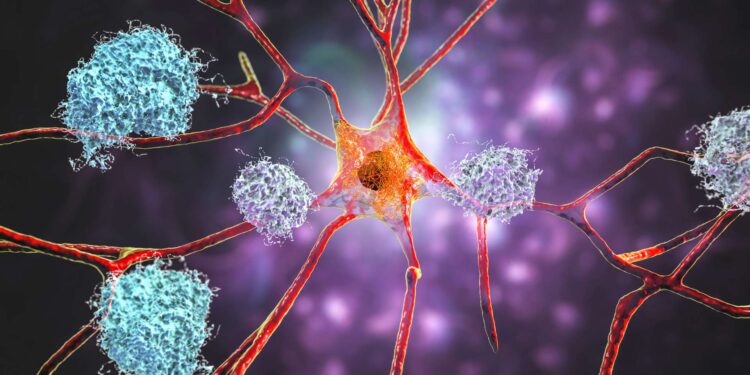It is essential to find new strategies for the prevention and treatment of Alzheimer’s disease, the incidence of which is expected to triple by 2050. A new American study has found interesting results with Viagra, using AI and real patient data.
Phosphodiesterase-5 inhibitors such as sildenafil represent a promising avenue against Alzheimer’s disease. Sildenafil is the main component of medications used to treat erectile dysfunction (Viagra) and pulmonary arterial hypertension (Revatio).
New interdisciplinary research led by the Cleveland Clinic (United States) combines computer models with real human data, including observations of brain cells in patients with Alzheimer’s disease. The method paves the way for future clinical trials aimed at exploring the effectiveness of sildenafil in patients affected by the disease.
A reduction of more than 30% in Alzheimer’s diagnoses
Published in the Journal of Alzheimer’s Disease, data analysis revealed a 30 to 54 percent reduction in Alzheimer’s diagnoses among users of the drug compared to those who did not take it. The researchers also showed that sildenafil reduced levels of the neurotoxic protein tau — associated with Alzheimer’s disease when they accumulate — in brain cells of patients with Alzheimer’s disease. neurodegenerative diseaseneurodegenerative disease.
“ Our findings lend more weight to the repurposing of this existing, FDA-approved drug. FDAFDAas a new treatment for Alzheimer’s disease, which is in great need of new therapiestherapies ” Feixiong Cheng, who led the research, said in a statement. Medication repurposing, which is the reuse of an existing medication, saves time and effort.moneymoney. “ We believe our results provide necessary evidence for clinical trials to further examine the potential effectiveness of sildenafil in patients with Alzheimer’s disease. », concludes the researcher.
Alzheimer’s: when Viagra attacks brain plaques!
Article from Destination Santé et Futura, published on February 9, 2024
In mattermatter erectile dysfunction, the reputation of Viagra is well established. What is less known is that this drug is of great interest to researchers in the fight against Alzheimer’s: a recent study showed that the “happiness pill” would reduce the risk of developing the disease!
Alzheimer’s disease is the most common neurodegenerative disease, with 1 million patients. Every year 225,000 new cases are recorded. And counting relatives and caregivers, there are 3 million people who are directly affected by the pathologypathology.
To overcome this neurodegenerative disease, work is increasing, but not all going in the same direction. Some seek to eliminate amyloid plaquesamyloid plaques in the brainbrain people in the early stages of the disease, while others try to uncover treatments capable of preventing or delaying its development. It is in this second category that this study, carried out by scientists from University College London and published in the journal Neurology. Their objective: to observe a possible effect of medications used against erectile dysfunction.
Did you know ? Certain foods may promote the onset of Alzheimer’s disease. Learn to recognize them with Julie Kern in La Santé sur Listen. © Futura
Why exactly this type of medication? “Phosphodiesterase type 5 inhibitors (found in commonly used medications like Viagra®editor’s note) have proven to be a promising avenue against Alzheimer’s disease, at least in animal models.explain the authors in a press release. However, work in humans remains inconclusive. So we conducted a study to evaluate the association.”
Risk of developing Alzheimer’s reduced by 18%
Their work focused on exactly 269,725 men, aged on average 59 years, who had recently been diagnosed with erectile dysfunction. None had memory problems at the start of follow-up which lasted five years. The scientists thus compared the 55% of participants who took medications for erectile dysfunction to the 45% who did not use them.
During the study, 1,119 people developed Alzheimer’s disease. “Those who took the drugs were less likely – 18% less likely – to develop Alzheimer’s disease”estimate the authors.
“Further research is needed to confirm these results, learn more about the mechanisms, and study the dosagedosage optimalexplain the researchers. A randomized trialrandomized trial and controlled with both male and female participants is warranted to determine whether these findings would also apply to women.”



